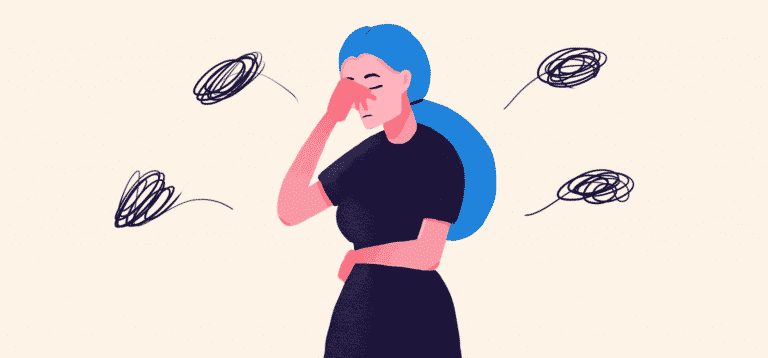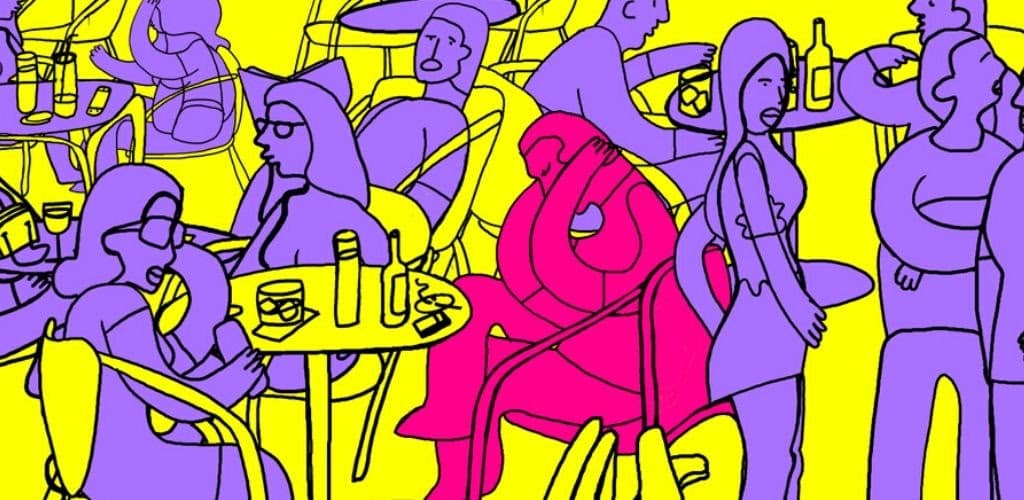If you’re living with social anxiety, you already know that it can spring up in many different scenarios. And, you’ve probably fallen victim to its isolating effects at some point.
Social anxiety can bring about intense symptoms that force some individuals to isolate themselves, avoiding family and friends, social situations, and even partners or spouses. Plus, it can halt the process of making new connections in your personal and professional life.
But, no matter how serious your anxiety feels, don’t despair. There is still hope!
In this article, we’ll explore how to deal with social anxiety in a variety of everyday situations. Plus, we’ll help you understand the symptoms you’re experiencing and the resources available for you to get help.
Keep reading to learn more.

Source: CalmClinic
What Is Social Anxiety?
Social anxiety disorder, also called SAD or social phobia, is described as the feeling of being nervous or uncomfortable in a social situation.
SAD and mild forms of social anxiety are common, so if you have it, you’re not alone.
The hardest part of living with anxiety is recognizing your symptoms and reaching out for help. And, if you’re reading this article, you’ve already taken an essential first step!
What Happens When You Have Social Anxiety?
Social anxiety often causes troublesome symptoms, and if left untreated, it can eventually lead to lasting effects.
Symptoms
Everyone experiences social anxiety differently. But, for most people, anxiety triggers can lead to feelings like:
- Dizziness and lightheadedness
- Rapid heartbeat
- Muscle tension
- Shortness of breath
- Stomach trouble and diarrhea
- A strange “out-of-body” sensation
Lasting effects
Over time, these feelings of discomfort can prevent people with social anxiety disorders from living a normal life.
It’s not uncommon to feel a need to avoid typical social situations and interactions. Eventually, this can affect personal and professional relationships and lead to ongoing issues like:
- Negative thoughts
- Low self-esteem
- Sensitivity to criticism
- Depression
- Poor social skills
Related: Social Distancing: Today’s Pandemic and Loneliness Epidemic
Social Anxiety at Work
Social anxiety in the workplace can negatively impact your career and keep you from making meaningful connections with colleagues and clients. Plus, it can be embarrassing and add stress to your daily life.
People living with SAD are often afraid to voice their opinions for fear of criticism. This can limit your ability to assert yourself at work, and in turn, lead to poor performance.
If you’re experiencing powerful anxiety symptoms while working, you’ll want to take action before any permanent damage is done.
But don’t panic! You can retrain yourself to feel less anxious in a professional setting through mindful practices like yoga and meditation, and self-soothing behaviors like deep breathing.
If your symptoms are intense and persistent, you might consider an online course or two, specifically designed to help you overcome your anxiety.
Social Anxiety at Meetings
Anyone who’s been asked to speak in public knows it can be nerve-wracking. Feelings of anxiety, blushing, sweaty palms, and even a racing heart are all pretty standard before making a big presentation.
But, for someone with social anxiety, the stress of these “on the spot” situations is too much to handle.
That’s because SAD causes you to feel a fear of being judged by others in social situations, and a fear of being embarrassed or humiliated.
Keep in mind that public speaking is the most commonly reported phobia among Americans. If you’re only experiencing strong symptoms before giving a speech or presentation, you might not have social anxiety at all.
Social Anxiety at the Gym
A trip to the gym is high on the list of anxiety triggers for many people, not just those who have social anxiety.
You might feel nervous about displaying your athletic abilities in front of others for fear that you won’t perform up to their expectations. And, you might be suffering from low self-esteem related to SAD.
Exercise is a natural way to boost your energy level, help you sleep, and improve your mood overall. So, you don’t want to miss any workouts!
If you tend to feel anxious at the gym, start by making some changes to your routine.
Try to avoid peak hours when you’ll have to interact with larger crowds of people. If possible, choose a gym that isn’t full of mirrors, which can trigger anxiousness all on their own. Or, switch to working with a trainer for a more focused, one-on-one experience.
If you’re serious about hitting the gym but can’t handle the anxiety alone, consider taking a friend or “workout buddy” along to help you relax.
Social Anxiety at a Party
Social anxiety can turn a fun night out into a real nightmare. In fact, parties and social gatherings are among the most typical situations to feel nervous and stressed out in.
Walking into a room full of strangers, or meeting people for the first time may be challenging if you have SAD. You might clam up when meeting someone new, or struggle with small talk and eye contact, two common triggers for anxiety.
You might also feel nervous about eating and drinking in front of others or using a restroom outside your home.
Unfortunately, people living with social anxiety often rely on alcohol to cope in social situations. While a few drinks might help you feel better at first, it can also lead to dependency and worsening SAD symptoms over time.

If parties are overwhelming for you, stick to smaller social gatherings. Always bring a friend along, and be prepared to step outside for a short “time out” if you start feeling stressed.
Related: How to Deal with Anxiety at Work
Social Anxiety With Friends
In some cases, social anxiety can even impact your friendships.
Feelings of anxiousness might make it hard to focus on what your friends say to you during a conversation, making it seem like you aren’t paying attention. And, it can make small talk difficult and awkward.
If you’re experiencing social anxiety around your close friends, you’re probably experiencing some of the SAD’s long term effects like low self-esteem and depression.
One of the first steps to overcoming these feelings is taking the time to improve your relationship with yourself. Building personal connections with others is easier when you feel happy and confident on your own.
Plus, an improved self-image will help you feel motivated to spend time with friends and even open up to them about the symptoms you’re experiencing.
Social Anxiety at Reunions
Are you feeling worried or anxious about an upcoming event?
If you have social anxiety, you might spend weeks worrying about a reunion, get-together, or a large social gathering. And, your symptoms will likely worsen immediately before the event.
Worse yet, you might waste time and mental energy “replaying conversations in your head” and worrying about how you acted afterward.
Depending on the severity of your symptoms, big events can be some of the most stressful of all the different situations that trigger social anxiety. And, if you’re feeling super stressed leading up to a reunion or get together, you are already setting yourself up for failure.
Visualization techniques can help you “check out” of a stressful situation. This can be used leading up to a big event, during a quiet moment outside if you’re feeling overwhelmed, or even as a tool to decompress after the fact.
Social Anxiety With a Partner
All aspects of dating and romantic relationships can trigger social anxiety. This includes chatting on the phone, going on dates, and hanging out quietly.
Plus, there’s nothing more frustrating than feeling anxious around the person you trust most. After all, you know they aren’t to blame!
If you’re experiencing SAD symptoms while spending time with your partner, start by talking to them about what’s going on. Reading aloud may trigger further anxiety, so don’t be afraid to write a thoughtful letter or record a video message if it helps you relax.
It’s important to keep in mind that the symptoms of your anxiety are likely impacting your partner, too. So, try to stay patient and listen thoughtfully to their responses.
Even if they seem defensive or frustrated, you both must remain calm while you’re working together to overcome these feelings of stress and anxiety.
Social Anxiety While Under Lockdown
Some probably assume people with SAD are enjoying the social distancing mandates brought on by the coronavirus pandemic. But that’s sadly not the case and everyone deals with isolation differently.
Many people — even those without SAD — are nervous going out in public during these times. This feeling of tension, panic, and urgency while in a packed grocery store can have major effects on a person with social anxiety disorder. It can become beyond possible for them to go to the store to get necessities or to the pharmacy to pick up medication.
Not having the need to go to work, or the gym, or social gatherings can also cause people with SAD to experience even more severe anxiety. People with anxiety know there’s nothing worse than being alone with your own thoughts. It can feel like you’re missing that support system of friends and family you once had and that puts an emphasis on negative thoughts that are most likely not true.
You’re Not Alone
If this article described some familiar feelings, it’s ok. You aren’t alone.
There are tons of helpful resources for people with social anxiety. Start by doing a little online research. You’ll soon see that a few changes to your daily routine can start you on the road to recovery.
A healthy diet, plenty of physical exercise, and adequate sleep are mandatory for reducing your anxiety symptoms. Adding a mindful practice like yoga or meditation might also be helpful.
Consider an online course that will help you break bad habits, learn new behaviors, and feel supported as you face your social anxiety head-on.

How to Deal With Social Anxiety
Now that you know a bit about how to deal with social anxiety, you’re ready to take control of your symptoms and get your life back!
Start with a little self-care and positive changes to your daily routine. Don’t forget to do a bit of homework when it comes to your symptoms and treatment. And, most importantly, don’t give up.
Connect with us today for more information on our personal development courses, and to ask any questions you might have for our instructors.

